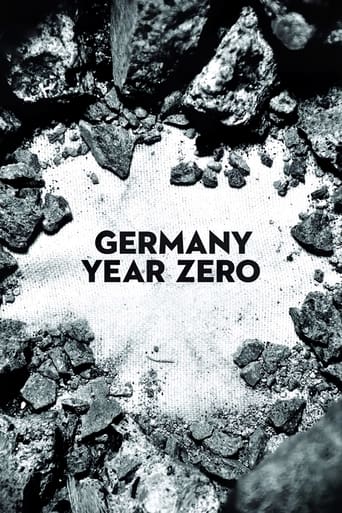eckleind
"Germany Year Zero" is just one notch above a snuff film. Why an acclaimed cinematic artist would revel in depicting and amplifying the misery of people is beyond me. The posing of any child murdering his father is contrary to natural behavior even under stress, according to my wife, a pediatric psychiatrist. Yet this child is built up before the act as a normal boy, even exemplary in his familial relationships. A totally disgusting display of Rossellini's twisted soul.
Kirpianuscus
it is the right choice to admire it from the artistic perspective. but this represents one of many options. and, maybe, the useful way to discover this special film is the reflection of near reality. not only in the context of the WW II. because the message remains painful because it is a slice of contemporary reality. because the purposes - survive and need to impose the rules against society rules is the same. nothing different. nothing out of well known forms. and this does a gem of neo-realism more than a good example of cinema. but support for see , in profound manner, the near every day reality. to understand. the war, the survive, the situation of a boy among the shadows of war, the meanings of year zero for the conflict zones, the hope as more than noble emotion.
Armand
a story of war. ruins. poverty. angry. black market. ruins. and a boy. the story of Edmund is gray and not complicated. support for his family, victim of time, instrument of a teacher, piece in a blind struggle, without any sense of existence, part of confuse vision about values, it is , in same measure, victim and butcher. his butcher. the film is like a knife edge. cold,precise, impersonal. a city and its people. crumbs of war and slices of hate. seeds of a new world. and a lot of problems. a testimony. a picture. a neo-realistic movie. a verdict in which Rosellini includes pieces of lost universe. a manifesto, a silence moment, a trip in womb of a present past. because Berlin, this Berlin, is, in same measure Sarajevo of 1995 or Belgrad of 1999, a town from Rwanda or a place from Irak in 2003.
valadas
This movie is one of the three Rossellini's neo-realist movies that make the trilogy of war of his direction. The other two are "Roma Città Aperta" and "Paisà". Despite having won the First Prize at the 1948 Locarno Festival it was a commercial half-failure. In 1947 in Berlin, Germany, a city destroyed by the war, full of ruins and rubbish everywhere, with people and families living in awful conditions of poverty and housing squalor, a 13 year old boy resorts to petty thefts and tricks to get money and food to help to support his family composed by him plus an old and ailing father, a sister who wins money at night by going to dance and drink in nightclubs with the allied men and a brother who lives half-hidden and unregistered for fear of being arrested and sent to a prisoners camp since he had fought there till the end of the war. The best of this movie is its documentary value since it shows in a very realistic way the images of a Berlin almost totally destroyed by the war and the life conditions of its population. The story is not bad itself but in the end it introduces an unnecessary too dramatic ending by the boy poisoning his father to death partly out of pity and to put an end to his suffering and partly to alleviate the family of the burden he represented. It's however one of the best movies of the Italian neo-realist school that flourished in the forties and fifties of last century.


 AD
AD



